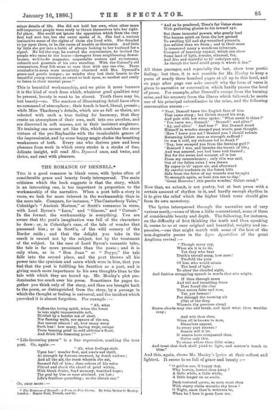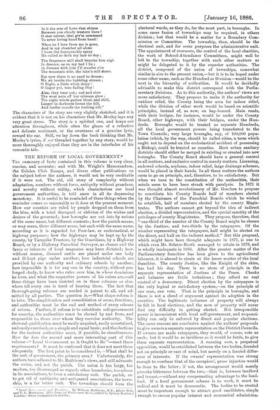THE ROMANCE OF DENNELL*
Tsis is a good romance in blank verse, with lyrics often of considerable grace and beauty freely interspersed. The main criticism which the book suggests is that the story, which is an interesting one, is too important in proportion to the workmanship of the narrative. When a poet tells a story in verse, we look for more interest in the workmanship than in the mere tale. Compare, for instance, "The Canterbury Tales," Coleridge's "Ancient Mariner," or Scott's romances in verse, with Lord Byron's " Lara," and " Giaour," and "Corsair." In the former, the workmanship is everything. You are aware that the poet's imagination was full of the characters he drew ; or, in Coleridge's case, of the tale of wonder that possessed him ; or in Scott's, of the wild scenery of the Border raids ; and that the delight you take in the result is caused not by the subject, but by the treatment of the subject. In the case of Lord Byron's romantic tales, the tale is far more prominent than the poem ; and it is only when, as in " Don Juan" or " Berpo," the tale falls into the second place, and the pcet throws all his power into the cynicism and scorn which were in him, that you feel that the poet is fulfilling his function as a poet, and is giving mach more importance to his own thoughts than to the tale with which they are bound up. Mr. Mozley's plot pre- dominates too much over his poem. Sometimes for pages to- gether you think only of the story, and then are brought back to the poem, as distinguished from the story, by a passage in which the thought or feeling is universal, and the incident which provoked it is almost forgotten. For example :— "Ali, what
Suffers the loving spirit, when the loved Is into night impenetrable reft, Divided by a barrier not of steel, Nor flaming walls, nor spaces of the sea, But merest silence ! ah, how many weep Such loss! how many, having wept, escape From burning grief to cold oblivion's flood, And drink life-lessening peace !"
"Life-lessening peace" is a fine expression, marking the true poet. Or, again:-
"Ab, what feelings stole Upon her! wonder first, and awe's sad thrill, At strength by fortune crowned, by death undone ; And all the air, the room wherein she eat, Seemed full of him ; then echoes of his voice Flitted and shook the chord of grief within, With blank desire, fond memory, vanished hope ; The goal by him so near attained, yet lost ; Life's fruitless quenching; so the circuit ran."
Or, once more :—
• The Romance of Bennett: a Pe em in Fire Cantos. By John Rickards Mosley. London : Regan Paul, Trench, and Co.
"And as he pondered, Time's far ;istas shone With gathering glories to his inward eye.
But those immortal powers, who gently lead The human spirit on from the low ground To swelling hill and sky-wreathed pinnacle, Are subtler than we deem ; and in their store
Is treasured many a wondrous telescope,
Compact of heavenly crystal, which can show Some land of light, remote, ethereal, far, And dim and doubtful to th' unholpen eye, As though the hand could grasp it where it lies."
All these passages, and especially the last, show true poetic feeling; but then, it is not possible for Mr. Mozley to keep a poem of nearly three hundred pages at all up to this level, and on page after page one asks oneself why the form of verse is given to narrative or convesation which hardly passes the level of prose. For example, after Dennell's escape from the burning mine, and his recovery from the illness which followed, he meets one of his principal subordinates in the mine, and the following conversation ensues : — "Next, Dennell knew the English face of him
That came along ; but Gelart stayed his step, And pale with low voice spoke : What name is thine ?' You know me ; Dennell.' Dennell ! and alive !'
Ay, and alive.' 'And how ?' But Dennell stood Himself in wonder steeped past words, past thought.
'How knew you not ? deemed you I should refrain Returning hither, soon as strength sufficed ? Or was it told, my sickness led to death ?'
'Nay, how escaped you from the burning gulf ?'
Rescued I was, and breathe the breath of life; And was assured, you had been told thereof ; But for the scene and manner, all is lost From my remembrance ; only this was said, Out of the fallen ruins I was drawn By ropes to th' upper air, and afterward By careful tendance on the forest hills Safe from the fever of my wounds was brought To strength again, as here you see to-day.'
Great Heavens ! this passes wonder,' Gelart cried."
Now that, we submit, is not poetry, but at best prose with a certain amount of rhythm in it, and hardly enough rhythm in it to give the relief which the higher blank verse should give from its own monotony.
The lyrics interspersed through the narrative are of very various merit,—some of them a little conventional, some of them of considerable beauty and depth. The following, for instance, on the difficulty of first thinking the troth and then speaking it, seems to us at once original and beautiful, weighty and im- pressive,—one that might match with some of the best of the non-dogmatic poems in the Lyra Apostolica of the great Anglican revival :—
"Though many cry,
What sin it is to lie, Yet they who bear Truth's travail-mug, how rare !
Twofold the pain Of him who would attain The land of light : To clear the clouded sight, And fashion struggling speech in words that aim aright.
If thou through tears And toil and trembling fears Hast found the clue That severs false and true, Yet, yet beware !
For through the teeming air
(Out of the deep
Wherein thy passions sleep) Storm-olouds may rise and break, and spoil what thou wouldst reap ; And wilt thou then, When all is known to men, Blameless appear, In every part sincere ?
Scarce will it be, If snares have compassed thee.
Strive only this.
To atone where thou didst miss; And trust that dark shall yield to light, and sorrow's touch to bliss."
And this, again, shows Mr. Mozley's lyrics at their softest and lightest. It seems to us full of grace and beauty :— "0 golden sun, 0 happy day, Why hasten, hasten thus away ? A little while, a little while, A little longer on us smile.
Dark-vestured queen, so soon must thou With starry circle wreathe thy brow ? 0 Night, anon thou' welcome be, When he I love is gone from me. Is it the star of Love that shines Between you cloudy western lines ? 0 star untrue, that giv'st command To sever loving hand from hand!
When he I love from me is gone, And in my chamber all alone I loose the honeysuckle spray He culled to deck my hair to-day; The fragrance still shall breathe him nigh In dreams, as on my bed I lie ; In dreams with him I'll wander o'er The mountain side, the lake's still shore.
Bat now there is no need to dream ; We sit beside the bubbling stream ; 0 Night, a little while delay !
0 linger yet, wan fading Day !
Alas, they hear not ; sad and slow The west puts off her crimson glow ; The night winds gather bleak and chill, Larger in darkness looms the hill, And louder sounds the rushing rill."
The characters of the story are very slightly sketched, and it is evident that it is not on his characters that Mr. Mozley lays any very great stress. The story is a spirited one, and keeps our attention throughout, while often the gleam of a reflective and delicate sentiment, or the sweetness of a genuine lyric, reward the ear. Still, we lay down the book thinking that Mr. Mozley's lyrics, if not threaded together by any story, would be more thoroughly enjoyed than they are in the interludes of his romantic tale.



































 Previous page
Previous page